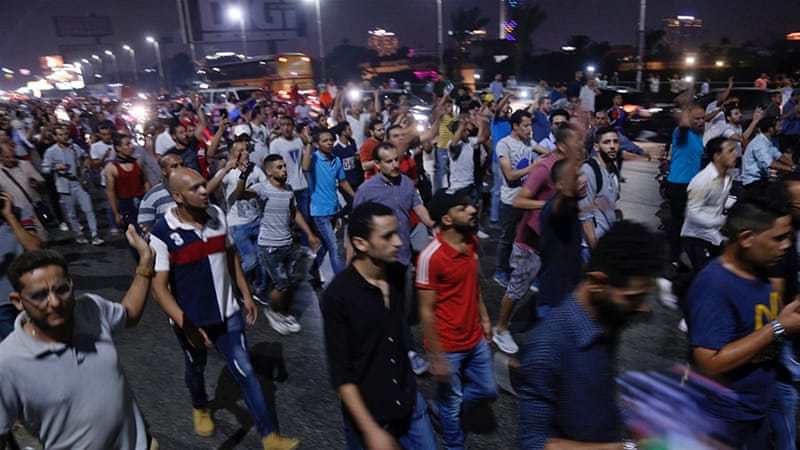
Egyptian authorities have enacted heightened security measures, including sealing off Tahrir Square in Cairo entirely, as the country braced for further protest.
Demonstrations were expected on what some have called the “Friday of Salvation” after hundreds of protesters took to the streets in major Egyptian towns and cities last weekend, calling for an end to the reign of the president, Abdel Fatah al-Sisi.
But Egypt’s military-backed leader attempted to project an image of business as usual in a rare interaction with the public when he greeted a crowd gathered to welcome him at Cairo airport. “You didn’t have to wake up on a Friday, it’s not worth it. Don’t worry about anything,” said Sisi, as he returned from the UN general assembly in New York. “What happened before will not happen again.”
At least 1,900 people were detained after sudden demonstrations in Cairo, Suez, Alexandria and elsewhere last Friday and Saturday. The mass arrests mark the single largest spate of detentions since Sisi came to power in 2013. Some demonstrators said they were determined to protest, despite a statement from the Egyptian ministry of the interior which made clear it intended to use force to quash any demonstrations that took place on Friday.
The loud wail of police sirens could be heard throughout Friday over Tahrir Square, a vital intersection in central Cairo that was the centre of protests that overthrew Hosni Mubarak in 2011, and the gathering point for demonstrations against the late former Islamist leader Mohamed Morsi in 2012 and 2013.
Egyptian authorities closed three metro stations underneath the symbolic site, with barricades and checkpoints on surrounding streets diverting traffic to prevent access. Police cars patrolled the empty square while security officials stopped and searched pedestrians in the surrounding areas. Rights groups feared that more would be detained.
Amnesty International called on world leaders to prevent a crackdown on demonstrators. The Franco-Egyptian Initiative for Rights and Freedoms published a letter to France’s President Emmanuel Macron, calling on his government to “seriously consider its responsibilities concerning the use of French weapons against peaceful protesters”.
Egypt’s attorney general, General Hamada Al Sawy, said late on Thursday night that his office had conducted extensive investigations following the arrest of the demonstrators. He said detainees’ confessions revealed that some of those protesting were motivated by economic hardship, while others had been “tricked by social media pages”.
Sawy called on Egyptian citizens wishing to “practice their right to express their opinion through protesting to follow legal procedures by notifying the appropriate authorities”.
A controversial law passed in 2013 ruled that Egyptians wishing to protest must obtain permission from the ministry of the interior.
Sisi, who swept to power in 2013 in a military coup precipitated by the anti-Morsi protests, has overseen a dramatic crackdown on freedom of speech and public dissent, considered by observers to be the worst in Egypt’s modern history. His expansion of Egypt’s bloated security state has led to a spike in the authorities’ widespread use of torture and police brutality, cited as potential crimes against humanity by the rights group Human Rights Watch. The country’s prisons hold an estimated 60,000 political prisoners.
Yet last week’s rare example of a public outcry against Sisi’s rule chipped away at the facade of the Egyptian regime’s efforts to keep citizens fearing and compliant. Former Egyptian military contractor Mohamed Ali, whose social media videos sparked the protests, has called for a million Egyptians to march on Friday.
Ali has alleged that the Egyptian military squandered public funds to build palaces and luxury hotels, including opulent palaces for the president. Sisi later deniedthe claim, calling them “lies and slander”.
“Of course I have built presidential palaces, and I will build presidential palaces,” he said. “But they are not for me, they are for Egypt.”
The corruption claims spoke to deep discontent among many Egyptians, living in a country where 32.5% of people live below the poverty line, according to the government’s own estimates. Many have struggled to maintain their standard of living since the government began harsh austerity measures, dramatically raising everyday costs through cuts to vital subsidies on commodities such as fuel and electricity.
While protests were expected in defiance of the state, a celebration entitled “For the Love of Egypt” was scheduled to take place in Cairo’s middle-class area of Nasser City, attended by Egyptian celebrities.
“Many Egyptians are understandably nervous about a new uprising. One must bear in mind that from the perspective of most Egyptians they have overthrown two governments since 2011 and for most of them their standard of living has deteriorated each time,” said Timothy E Kaldas of the Washington thinktank the Tahrir Institute for Middle East Policy.
“That said, the popularity of Sisi and his government has been declining for years as people’s standard of living has plummeted and the number of Egyptians in poverty has risen substantially.”
You may be interested

WAFU B U-17 Girls Cup: Ghana Edge Gallant Flamingos On Penalties In Final
Webby - December 22, 2024Despite a spirited performance Nigeria’s Flamingos lost on penalties to hosts Ghana on penalty shootout in the final of the…

Bournemouth Equal Burnley’s Old Trafford Feat After 3-0 Win Vs United
Webby - December 22, 2024Bournemouth’s 3-0 win against Manchester United on Sunday meant the Cherries equaled Burnley’s feat at Old Trafford.United went into the…

Vitolo Announces Retirement From Football
Webby - December 22, 2024Former Spain forward Vitolo has announced his retirement from football.The former Atletico Madrid, Las Palmas and Sevilla confirmed his retirement…


















![American Pastor, David Wilson Seen Eating The Box Of Woman Who Isn’t His Wife [Video]](https://onlinenigeria.com/wp-content/uploads/2019/10/american-pastor-david-wilson-seen-eating-the-box-of-woman-who-isnt-his-wife-video-150x150.jpg)






![Footballer, Daniel Sturridge Vows To Offer £30,000 Reward For His Missing Dog [Video]](https://onlinenigeria.com/wp-content/uploads/2019/07/footballer-daniel-sturridge-vows-to-offer-30000-reward-for-his-missing-dog-video-150x150.jpg)
![APC Youths Campaign For Osinbajo 2023 Presidency, Says It’s The Will Of God [Photo]](https://onlinenigeria.com/wp-content/uploads/2019/09/apc-youths-campaign-for-osinbajo-2023-presidency-says-its-the-will-of-god-photo-150x150.jpg)

